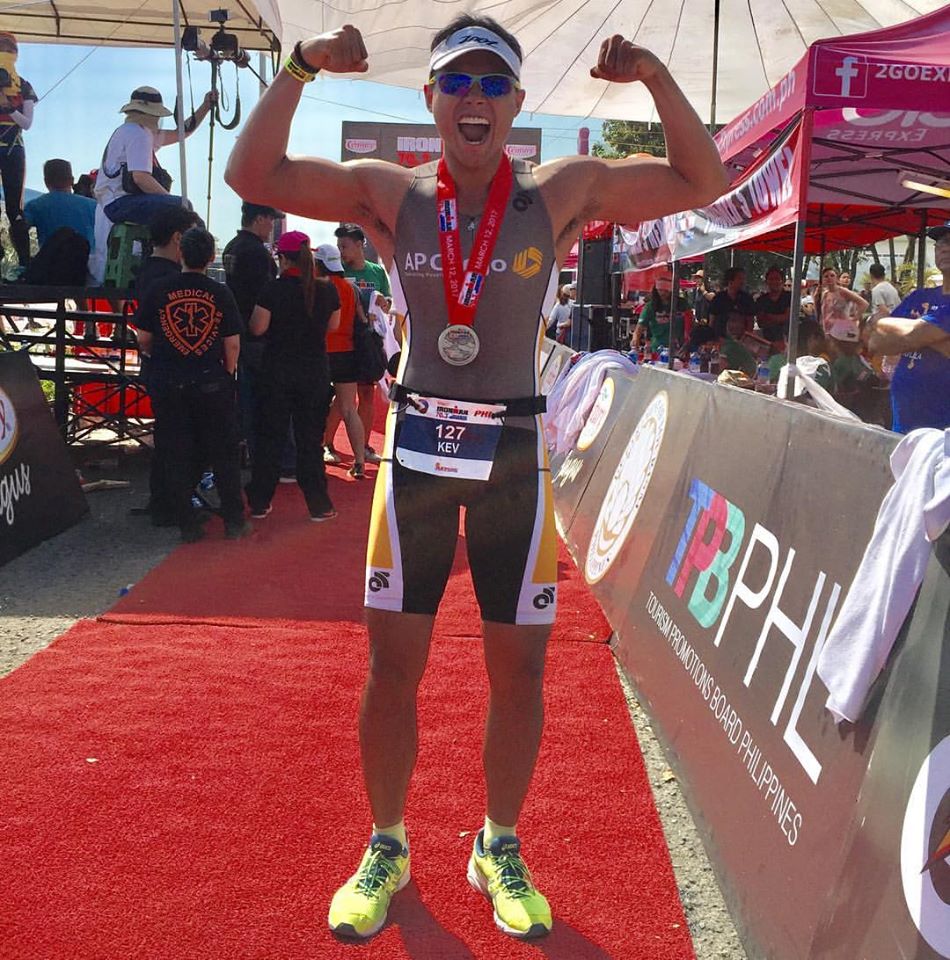Triathlete finds true meaning of victory after road mishap

Right at the peak of his Ironman training, Kevin Lapeña couldn’t have been in more perfect shape. The triathlete and media professional, after all, had it all planned out: Commit to an intense four-month fitness program, whip himself into top condition, then conquer the punishing swim-bike-run competition.
But just a couple of weeks before his biggest race, one regular training day turned into a bloody bike accident where Lapeña fractured his jaw and right arm, dislocated a shoulder, damaged four front teeth and suffered temporary amnesia.
“In the early days of my confinement, everything was a big blur,” said Lapeña. “I had memory loss, then I had pain killers day in, day out so it was a blur.”
Speeding downhill, the 27-year-old saw a truck suddenly charge from a blind intersection. He instinctively made an abrupt turn to avoid ramming into it, but lost control, got thrown off like a rag doll and hit the pavement hard.
“When I snapped into consciousness, immediately it was like, ‘Oh man, just two more weeks and I would have been in Cebu racing in Ironman.’ That would have been my first,” said Lapeña. “I was so frustrated because I trained so hard for it. I prepared so much for it. After four months of rigorous training twice a day, I was in peak physical condition. So for 15 minutes, I was very angry.”
But the frustration from ditching all the hard work didn’t last long. Lapeña soon channeled his competitive drive into healing faster.
“Initially, it was really difficult getting over the fact that I knew that I would be put on the shelf for awhile,” he shared. “But after that, it was more of moving forward—like ok, I won’t be able to race, so what should I do moving forward? I have to get back up and be a normal guy again.”
“I just had this mindset, this constant disposition not to sulk and to keep on getting stronger,” Lapeña added. “So even if I couldn’t move in the hospital bed, I was trying to do simple things like sitting up on my own, getting the remote to adjust the bed on my own, trying to stand up and walk to the bathroom as often as I could. I really pushed myself to get better.”
But as strong willed as he was, there were basic things that the very active Lapeña—who works as a television and event host, produces and writes for a travel show, a magazine and an online publication—just couldn’t do yet.
“Recovery was very complex and difficult,” he recalled. “When I got home from the hospital, I really had to be taken care of because my movement was compromised. And knowing that I couldn’t do much—eat properly, drink properly, put on a shirt on, go to the rest room—that was very humbling.”
There was no masking the pain, too. “The physical part was really excruciating, especially when I started rehab,” Lapeña said of the rehabilitation program he needed to regain full function and strength.
“It was really painful,” he added. “It might have been the most painful I have gone through in my life.”
Doctors gave Lapeña six months before he could ease back to his active lifestyle. But incredibly, it only took the 5-foot-10 triathlete two months to get back to training for another race.
“That psychological drive probably translated to the physical side,” said Lapeña. “It helped me recover faster than a normal person would.”
“More than the physical recovery, it’s really the mindset,” he noted. “Your body will naturally heal. But for you to heal properly and quicker than normal, it’s really in your mindset and your drive. If you get hurt, don’t allow yourself to get traumatized. Just pick yourself back up. There’s no reason for you to sulk or internalize being in the hospital or being injured. Just focus on getting better and better as each day passes, and you’ll be surprised that you’ll be back on your feet.”
Despite his positive outlook, Lapeña’s accident had his family and friends all worried.
“A lot of people were trying to convince me to stop,” he said. “Everyday my mom would make it a point, one way or the other, to persuade me not to do it anymore. Until now, my mom asks me from time to time when I’d sell my bike.”
Lapeña, though, wouldn’t drop those months of hard work again. “I would just tell my mom, ‘Don’t worry, I’ll be careful or I’ll put it into consideration.’ But at that time, I had already registered for the next Ironman. I had already registered for this other race and I had also heavily been into training, so it’s not like my mind would be set elsewhere.”
By February 2017—just seven months after the accident—Lapeña got a feel of the triathlon race course again and surprisingly won the relay event. A month later, he finally accomplished what he had been driven to do a year earlier: conquer the Ironman challenge.
“After the race, it was a big load off my chest. I didn’t even bother how I fared,” said Lapeña. “Probably that Ironman would be the most significant race for me because of the events leading up to it. It had more meaning. It’s more than proving that I can finish an Ironman distance race. It’s proving to people around me, and those that I don’t know, that it is possible to come back from such an ordeal—and to come back in a way not everybody would expect.”














